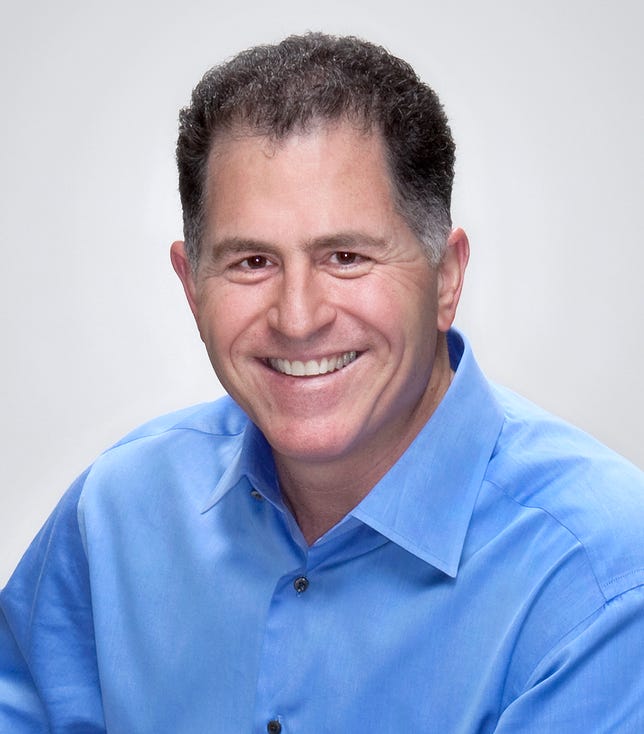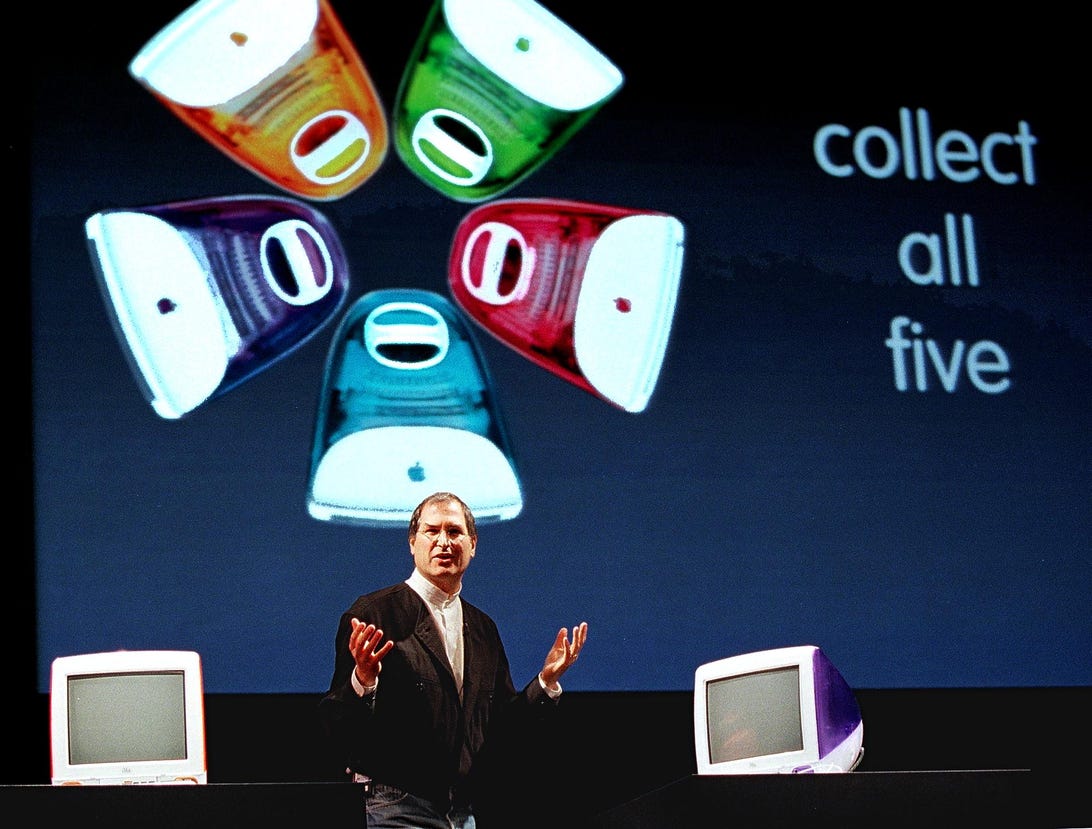In the decade since Steve Jobs passed away on Oct. 5, 2011, the iPhone, Mac and iPad have helped turn Apple into one of the most valuable companies on the planet, with over a billion people now making Apple's technology part of their daily lives.
It's a big change from 1997 when, after returning as interim CEO to an Apple that was months away from bankruptcy, Jobs was looking for help and famously got a $150 million cash investment from Microsoft and Bill Gates and gave Microsoft's Internet Explorer a boost over the popular Netscape Navigator browser. But lesser known is that he also tried to cut a deal with Michael Dell and his namesake PC company that might have changed the course of Apple and technology history forever.
In a memoir being released this week called Play Nice But Win, Dell talks about his teenage infatuation with the Apple II; about meeting Jobs, who was 10 years his senior, at a computer user group; and about the partnership that never was: Jobs wanted Dell to license the Mac operating system -- Mac OS X -- and ship it on his fast-selling, low-priced Intel-based PCs. And despite the media portraying the two as archrivals, Dell says he and Jobs became good friends, with Dell describing Jobs, who passed away on Oct. 5, 2011, as a brilliant entrepreneur, a savvy marketer and a dreamer and idealist who helped lead one of the greatest business turnarounds in history and who helped popularize consumer electronics devices, including the smartphone.
"Anybody who's going to do something amazing has to have a somewhat different and unconventional approach," Dell, 56, said in an interview when asked about Jobs' legacy. "You can't be following the rules and making amazing things happen. Steve was certainly exceptional in that regard."
Meeting Steve Jobs
Dell's fascination with tech began when he was a kid, he says, playing with his dad's slide rules and adding machine -- "it used to make this incredible noise every time it would roll through" -- before getting a National Semiconductor calculator when he was just 8 years old. "I loved math and I loved this idea of a calculating machine," he tells me.

Michael Dell
Courtesy of DellWhile taking a math class at his public junior high school in Houston, the school, fortuitously, got a teletype terminal. "To me, it was just amazing that you could write programs. It was the dawn of the personal computer age," Dell says. "The idea that you could have your own computer and you could program it was just the most cool thing that I could have thought of, and that got me started."
That fascination led to the start of his "Steve Jobs story." In 1979, when he was 14, he begged his parents to let him buy an Apple II, which he recalls was a pricey $1,298 at the time. After it arrived, Dell unboxed what he describes as a beautiful computer -- and then immediately took it apart to see how it worked.
"I have this belief you have to take something apart to understand it," he says. "I wanted to understand everything there was about how this machine worked. The great thing about the Apple II back then was each of the chips was clearly marked and you could understand exactly what it was. There were books you could get that described how each chip worked. ... I ate it all up."
By age 15, Dell says he looked to Jobs not just as a computer pioneer but also as a business entrepreneur after meeting Apple's co-founder in the spring of 1980, when a then 25-year-old Jobs spoke to the Houston-based computer user group Dell belonged to.
"When he entered the room at our meeting, it was as though the waters parted," Dell writes in his book, Play To Win. "He spoke in soaring metaphors ... he was saying -- with his personal computers -- people would have the capacity to accomplish the unimaginable."
Five years later, after the PC business Dell started in his college dorm room took off, he would get to know Jobs and call him a friend.
Fast forward to 1993. Jobs, ousted from Apple after a fallout with the company's board in 1985, had started a new company called Next and created a beautiful (but expensive workstation), with its own operating system, as well as software called WebObjects for building web-based applications. Dell says Jobs came to his house in Texas several times that year, trying to convince him to use the Next operating system on Dell PCs by arguing that it was better than Microsoft's Windows software and could undermine the Unix workstation market being touted by Sun Microsystems. The problem, Dell says he told Jobs, was that there were no applications for it and zero customer interest.
Still, Dell's company worked a little bit with Next and used WebObjects to build its first online store in the mid-'90s.
In 1997, Jobs rejoined a struggling Apple after it acquired Next for $429 million and pitched Dell on another business proposal. Jobs and his team had ported the Mac software, based on Next's Mach operating system, and had it running on the Intel x86 chips that powered Dell PCs. Jobs offered to license the Mac OS to Dell, telling him he could give PC buyers a choice of Apple's software or Microsoft's Windows OS installed on their machine.

After failing to convince Michael Dell to form a partnership, Jobs took Apple in its own direction, announcing new computers like the colorful iMac in 1998.
John G. Mabanglo/Getty Images"He said, look at this -- we've got this Dell desktop and it's running Mac OS," Dell tells me. "Why don't you license the Mac OS?"
Dell thought it was a great idea and told Jobs he'd pay a licensing fee for every PC sold with the Mac OS. But Jobs had a counteroffer: He was worried that licensing scheme might undermine Apple's own Mac sales because Dell computers were less costly. Instead, Dell says, Jobs suggested he just load the Mac OS alongside Windows on every Dell PC and let customers decide which software to use -- and then pay Apple for every Dell PC sold.
Dell smiles when he tells the story, saying the deal was a nice try on Jobs' part, but it wasn't "an economic proposition that made a lot of sense" since he'd have to pay Apple hundreds of millions of dollars in licensing fees even if his PC buyers didn't use the Mac OS. Another problem: Jobs wouldn't guarantee access to the Mac OS three, four or five years later. That could leave Dell customers using Mac OS out of luck as the software evolved.
Still, Dell acknowledges that the deal was a moment in history of what could have been.
"It could have changed the trajectory for Windows and Mac OS on PCs," Dell says. "But obviously, they went in a different direction."
That different direction led to Jobs continuing to evolve the Next-inspired Mac OS and retooling the Mac product line, including adding the candy-colored iMac in mid-1998. In October 2001, Jobs unveiled the iPod music player, followed by the iPhone in January 2007, a move that cemented the company's expansion into the consumer electronics market. Apple Computer Inc. renamed itself Apple Inc. on the day the iPhone was announced. The iPad showed up three years later.
'The archenemy of Apple'
Dell and Jobs sparred over the years but remained friends throughout -- even after Dell gave a quote at an industry conference late in October 1997 that led to him being viewed as what he says is "the archenemy of Apple." At the time, Jobs, only back a few months at Apple, was still trying to get the company on track financially.
Dell was then asked what he'd do to fix Apple if he were its CEO. After fending off the question twice, Dell says he finally answered, in frustration, "What would I do? I'd shut the company down and give the money back to shareholders."
The quote went viral, and Jobs was clearly ticked off. Dell says he contacted Jobs and explained the context of what he acknowledges today was an "unprofessional" comment. "He understood and wasn't too bothered by it."
But a few weeks later, Jobs did use the quote to help motivate his team, Dell says. Jobs hosted a company event to pitch Apple's new build-to-order manufacturing and distribution system and online store. He projected a large photo of Dell on the screen behind him, eliciting boos from Apple employees. Dell says that at the gathering, Jobs took a jab at his expense, telling his team that Dell was basically jealous of Apple's efforts, given that Dell had pioneered build-to-order.
"I probably would've done much the same thing if I was in his position," Dell tells me, adding this addendum to the story in Play Nice But Win: "When the company you started is fighting for its life, you do whatever it takes."
Even so, the Apple-Dell rivalry, real or imagined, didn't get in the way of their friendship, Dell tells me, commenting on Jobs' legacy. "We need dreamers and idealists -- people that have an unbelievable and difficult vision for how the future comes together -- to drive things."
Technology - Latest - Google News
October 05, 2021 at 07:00PM
https://ift.tt/3uLPikD
The Steve Jobs deal with Michael Dell that could have changed Apple and tech history - CNET
Technology - Latest - Google News
https://ift.tt/2AaD5dD
Shoes Man Tutorial
Pos News Update
Meme Update
Korean Entertainment News
Japan News Update
No comments:
Post a Comment